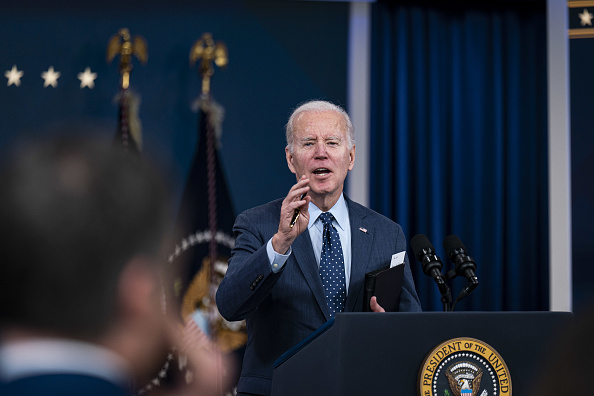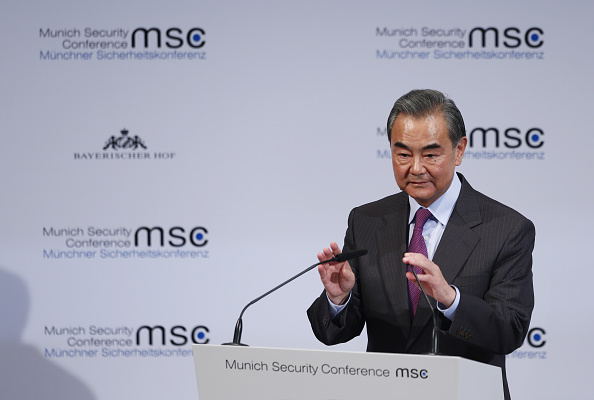
 Ripple Effects
Ripple EffectsThe diplomatic fallout over the shooting down of a Chinese balloon off the coast of South Carolina continues to rattle the foundations of the U.S.-China relationship. The balloon's trajectory is now being called into question, in what some U.S. security officials are portraying as a possible mistake. According to news reports, the "craft took an unexpected northern turn" and there is a possibility that "China didn't intend to penetrate the American heartland with their airborne surveillance device." U.S. officials had apparently been tracking the balloon for nearly a week by the time the balloon crossed into American airspace.
When asked about the incident, Foreign Ministry Spokesperson Wang Wenbin said "we have made it clear time and again that the entry of the Chinese civilian unmanned airship into U.S. airspace was a purely unintended, unexpected and isolated event caused by force majeure."
Nonetheless, the Biden administration claims that the Chinese military has targeted more than 40 countries across five continents with high-altitude spy balloons and that the U.S. is confident that the balloon manufacturer has "a direct relationship with China's military and is an approved vendor of the" army. The Senate on Wednesday unanimously passed a pair of resolutions condemning China.
China has accused the U.S. of waging information "warfare" on Beijing and signaled that it intends to take "countermeasures," as the fallout continues over the balloon ahead of a potential meeting between U.S. and Chinese officials.
Meanwhile, the White House has said that three other objects shot down over North America in the last week likely posed no national security threat, a clear distinction between those objects and the suspected spy balloon. President Biden said the three highflying objects were removed out of an abundance of caution and were likely tied to private companies or related to recreation or scientific research.
The incident continues to have ripple effects across the globe, as the United Kingdom kicks off a review of its airspace security. Prime Minister Rishi Sunak said the government would do "whatever it takes to keep the country safe."
Learn more in "Communication is Key," an interview with Craig Allen, President of the U.S.-China Business Council.
 Symbolic Ties
Symbolic TiesChina's top diplomat Wang Yi met with French President Emmanuel Macron at the start of a trip through Europe that is designed to bolster Chinese ties with the continent. The two leaders discussed the war in Ukraine, with Wang telling Macron that China is willing to further high-level exchanges with France, open up new prospects for bilateral relations, inject new impetus into the development of China-EU relations, and make new contributions in promoting international cooperation and tackling global challenges, according to Chinese state media.
This is Wang's first trip to Europe since taking the job of director of the Office of the Foreign Affairs Commission of the CPC Central Committee last year and occurs against a backdrop of a deterioration in EU-China relations. Wang will also visit Italy, Germany and Hungary. He is expected to end his trip with a visit to Moscow, days before the first anniversary of Russia's invasion of Ukraine. China has yet to denounce the invasion and it would likely be seen as a strong message of support for Russia if Wang's visit were to happen.
In Germany, Wang will attend the Munich Security Conference, which kicks off on Friday, where a potential meeting is planned with U.S. Secretary of State Antony Blinken. This would be their first face-to-face talks since the downing of the Chinese balloon led Blinken to postpone a planned trip to Beijing.
For the first time in two decades, Russian leaders were not invited to the Munich Security Conference, a yearly gathering of world leaders, politicians and security experts, which is set to open with a video address by Ukrainian President Volodymyr Zelenskyy.
 The Global Dash for Digital Dominance
The Global Dash for Digital DominanceYes, this title was generated by ChatGPT.
The global Artificial Intelligence race ramped up over the last few months with the release of American startup Open AI's chatbot, ChatGPT, in late 2022. The app wowed the world with its ability to provide realistic (although sometimes incorrect) answers to questions, and write prose, poetry, essays, and song-lyrics that are often hard to distinguish from human efforts.
While China's AI development has historically been on par or even surpassed that of the U.S., the new app has Chinese players and other tech firms doubling down on generative AI technology. And in January, China's leading search engine, Baidu Inc., announced they're preparing to launch their own rendition of ChatGPT in March.
The ERNIE bot, or "Enhanced Representation through Knowledge Integration," is undergoing final tests before its planned public debut, the company said.
Beijing has also pledged to support local tech giants in developing products that can rival ChatGPT, which isn't available in China. Leading tech firms will be supported in developing "an open-source framework and an application ecology of a large model," according to the Beijing Municipal Bureau of Economy and Information Technology.
Even more, in order to educate the future generation about AI technology and become an AI world leader by 2030, China has also introduced its first comprehensive AI textbook series designed for primary and secondary schools. Hundreds of schools will begin incorporating AI courses into their school's curriculum starting next year.
"The reason we want our students to systematically gain AI-related knowledge is to prepare them for a future where robots roam around and AI application prevails," Professor Wang Qingji, the chief editor of the AI textbook series, said.
Read more in "A Friendly Chat with ChatGPT About China," by Phil Cunningham, an independent scholar.
Prepared by China-US Focus editorial teams in Hong Kong and New York, this weekly newsletter offers you snap shots of latest trends and developments emerging from China every week, while adding a dose of historical perspective.
- 2023-02-10 Ballooning Tensions
- 2023-02-03 Hot Air
- 2023-01-27 Spheres of Influence
- 2023-01-20 China's Davos Pitch
- 2023-01-13 Strategic Encounters
- 2023-01-06 Common Challenges
- 2022-12-23
- 2022-12-16 All in On Africa
- 2022-12-09 Seeking Stabilization
- 2022-12-02 Turf Tension
- 2022-11-18 Thawing Ties?
- 2022-11-11 Face to Face
- 2022-11-04 The Pacing Challenge
- 2022-10-28 Third Time’s the Charm
- 2022-10-21 United as Steel
- 2022-10-14 Party Time
- 2022-10-07 Elections Incoming
- 2022-09-30 Hot Intrigue
- 2022-09-23 Global Gridlock
